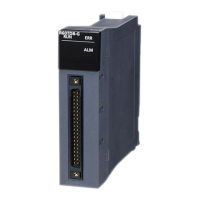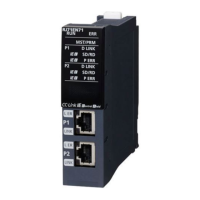25 CONSTANTS
25.5 Notation of Constants
403
25
25.5 Notation of Constants
This section describes the notation of constants.
In the notation of binary, octal, decimal, hexadecimal, and real numbers, the numbers can be separated using
an underscore (_) to make programs easy to see. For example, the double word [unsigned] in the notation of
binary is as follows.
2#1100_1100_1100_1100
The separations by underscores (_) are ignored in program processing.
Type Notation Example Applicable data type
Boolean value Set "FALSE" or "TRUE". TRUE, FALSE Bit
Add "K" or "H" before "0" or "1". K0, K1, H0, H1
Integral Binary Add "2#" before a binary number. 2#0010, 2#01101010,
2#1111_1111
• Word [unsigned]/bit string [16 bits]
• Double word [unsigned]/bit string [32
bits]
• Word [signed]
• Double word [signed]
Octal Add "8#" before an octal number. 8#0, 8#337, 8#1_1
Decimal Directly enter a signed or unsigned decimal number. 123, +123, -123, 12_3
Add "K" before a signed or unsigned decimal
number.
K123, K-123
Hexadecimal Add "16#" before a hexadecimal number. 16#FF, 16#1_1
Add "H" before a hexadecimal number. HFF, HEAD
Real number Decimal
notation
Directly enter a signed or unsigned real decimal
number with a decimal point.
2.34, +2.34, -2.34,
3.14_15
• Single-precision real number
• Double-precision real number
Add "E" before a signed or unsigned real decimal
number with a decimal point.
E2.34, E-2.34
Exponential
notation
Add "E" and a signed or unsigned exponent
(decimal) at the end of the real number.
1.0E6, 1.0E-6
Add a signed exponent (decimal) at the end of the
real number with "E".
E1.001+5, E1.001-6
String String Enclose a string in single quotation marks (' '). 'ABC' String
String
[Unicode]
Enclose a string in double quotation marks (" "). "ABC" String [Unicode]
Time Add "T#" or "TIME#" at the beginning. (Page
404 Notation of time)
T#1h,
T#1d2h3m4s5ms,
TIME#1h
Time

